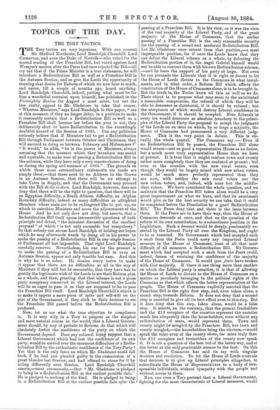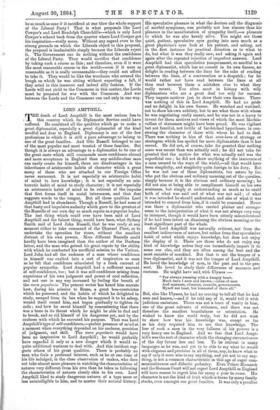TOPICS OF THE DAY.
THE TORY TACTICS.
THE Tory tactics are very ingenious. With one consent Sir Stafford Northcote, Lord Randolph Churchill, Lord Carnarvon, and even the Duke of Norfolk—who voted for the second reading of the Franchise Bill, but voted against Lord Wemyss's motion after the Peers had once rejected the Bill-1M cry out that if the Prime Minister is a true statesman, he will introduce a Redistribution Bill as well as a Franchise Bill in the Autumn Session, and so give the Lords the opportunity of showing that desire for Reform of which we now hear so much, and never, till a couple of months ago, heard anything. Lord Randolph Churchill, indeed, putting what must be for him a wonderful restraint upon himself, has published in the Fortnightly Review for August a most sober, but not the less crafty, appeal to Mr. Gladstone to take that course. " Whereas Ministers," says Lord Randolph in this paper, " are at this moment, if they no longer delay, in a position to make it reasonably certain that a Redistribution Bill as well as a Franchise Bill shall become law before the year is out, they deliberately elect to leave Redistribution to the exceedingly doubtful hazard of the Session of 1885. Can any politician seriously believe that if Ministers fail to get a Redistribution Bill through Parliament between October and Christmas, they will succeed in doing so between February and Midsummer ?" " It would," he adds, " be in the power of Ministers, always assuming that the measure which they introduce was sound and equitable, to make sure of passing a Redistribution Bill in the autumn, while they have only a very remote chance of doing so during the spring and summer of 1885." The grounds on which these most extraordinary statements are made are simply these,—that there need be no Address to the Crown in an Autumn Session, that there will be no attempt to take Votes in Supply, and that the Government may proceed with the Bill de die in diem. Lord Randolph, however, does not deny that there will be the right to question, that there will be an Egyptian difficulty, a South African difficulty, an Afghan Boundary difficulty, indeed as many difficulties as affrighted Members whose seats are to be endangered like to put up, on which to catechise Ministers and move the adjournment of the House. And he not only does not deny, but asserts, that a Redistribution Bill itself opens innumerable questions of both principle and detail, the minutest discussion of the smallest proposal" of which "is not only excusable but compulsory." So that nobody can accuse Lord Randolph of holding out hopes which he may afterwards wreck by doing all in his power to make the passing of a Redistribution Bill in any single Session of Parliament all but impossible. That right Lord Randolph carefully reserves. Nevertheless, his cue for the present is to make the passing of a Redistribution Bill in even an Autumn Session, appear not only feasible but easy. And this is why he is so sober. He strains every nerve to make it appear that there are no difficulties at all in the way of Ministers if they will but be reasonable, that they have but to gratify the legitimate wish of the Lords to see their Reform plan as a whole, and then, granting that that scheme is not a gross party conspiracy conceived in the Liberal interest, the Lords will be as eager to pass it as they are supposed to be to pass the Franchise Bill itself. Lord Randolph Churchill's object is to make it appear a mere piece of spite and self-will on the part of the Government, if they stick to their decision to see the Franchise Bill passed before the Redistribution Bill is produced.
Now, let us see what the true objection to compliance is. It is very wily in a Tory to propose as the simplest and most natural course in the world, that a Liberal Govern- ment should, by way of prelude to Reform, do that which will absolutely forfeit the confidence of the party on which the Government depend. Does any rational being Suppose that a Liberal Government which had lost the confidence of its own party, would be carried over the enormous difficulties of a Redis- tribution Bill by the enthusiastic confidence of the Tory Party ? Yet that is the only force on which Mr. Gladstone could fall back, if he had just pleaded guilty to the commission of a great blunder last Session, and had offered to atone for it by acting differently next Session. Lord Randolph Churchill asserts,—most erroneously,—that " Mr. Gladstone is pledged to bring in a Redistribution Bill at the earliest possible date." He is pledged to nothing of the kind. He is pledged to bring in a Redistribution Bill at the earliest possible date after the passing of a Franchise Bill. It is his view, as it was the view of the vast majority of the Liberal Party, and of the great
majority of the House of Commons, that the earlier passing of a Franchise Bill is the only reasonable security for the passing of a sound and moderate Redistribution Bill.
Let Mr. Gladstone once -retreat from that position,—a most
impregnable position, for if once the Lords know that they can defeat the Liberal scheme as a whole, by defeating the Redistribution portion of it, the angel Gabriel himself would not be able to content them with his own Redistribution scheme,. —and he loses the support of his party at large.. Not even he can persuade the Liberals that it is right or decent to let the House of Lords dictate to the Commons in what instal- ments, and in what order, a Reform Bill which affects the constitution of the House of Commons alone, is to be brought in. But the truth is, the Tories know all this as well as we do. Their object is to propose what may seem to the uninitiated a reasonable compromise, the refusal of which they will be able to denounce as dictatorial, if it should be refused ; but the acceptance of which would destroy Liberal confidence in the Government, if it should be accepted. Nine Liberals in every ten would denounce as absolute treachery to the princi- ples of the Liberal Party the proposal to accept the judgment of the Lords on an issue on which, by so large a majority, the House of Commons had pronounced a very different judg- ment. This is the very point in debate. This is vir-
tually the whole quarrel. The Commons say Even if no Redistribution Bill be passed, the Franchise Bill alone would secure—not so good a representative House as we desire,. but a much more truly representative House than we have at present. It is true that it might confuse town and county rather more completely than they are confused at present ; but even so the counties with the new rural voters, even though they would be largely mixed with new urban voters, would be much more perfectly represented than they are now, with neither the new rural voters nor the new urban voters, and, indeed, with none but the middle- class voters. We have considered the whole question, and we maintain that the Franchise Bill taken alone would be a very great improvement on what we have, and that its enactment would give us far the best security we can take, that it could be completed before the Dissolution by a good Redistribution Bill.' The Peers deny that, and there is the issue between them. If the Peers are to have their way, then the House of Commons descends at once, and that on the question of the reform of its own constitution, to a subordinate position in the Legislature. Such a descent would be deeply, passionately re- sented by the Liberal Party all over the Kingdom, and ought to be so resented. No Government which had accepted such a snub from the Peers could carry any important Liberal measure in the House of Commons, least of all that most difficult of all measures, a Redistribution Bill. No Govern- ment which had accepted such a snub from the Peers could, indeed, dream of retaining the confidence of the majority of the House of Commons. It would ipso facto have broken with that majority. If there is one thing more than another on which the Liberal party is sensitive, it is that of allowing the House of Lords to dictate to the House of Commons on a matter so peculiarly belonging to the political rights of the Commons as that which affects the better representation of the people. The House of Commons explicitly asserted that the Franchise Bill is the right first step, and, even taken alone, a sound step, towards Reform. It does not deny that a second step is essential to give all its best effect even to this step. But it does deny that this step, taken alone, would be a false step. It asserts, on the contrary, that the present freeholders and the £12 occupiers of the counties represent the counties much less adequately than the householders, even without any redistribution of seats, would represent them. Town and county might be mingled by the Franchise Bill, but town and county mingled,—the householders being the electors,would speak the voice even of the county alone, far more truly than the £12 occupiers and freeholders of the county now speak it. It is not a question of the best but of the better way, and of the better as the only practicable avenue to the best. On this the House of Commons has said its say with singular decision and resolution. To let the House of Lords overrule that decision is to give up Liberal principles altogether, to subordinate the House of Representatives to a body of irre- sponsible individuals, without sympathy with the people and without access to them.
Now, can even a Tory pretend that a Liberal Government, fighting for the most characteristic of Liberal measures, would
be so much as sane if it sacrificed at one blow the whole support of the Liberal Party I That is what proposals like Lord Cowper's and Lord Randolph Churchill's—which is only Lord Cowper's echoed back from the quarter where Lord Cowper got his inspiration—really mean. Without any regard even to the strong grounds on which the Liberals object to this proposal, the proposal is inadmissible simply because the Liberals reject it. The Government can do nothing without the confidence of the Liberal Party. They would sacrifice that confidence by taking such a course as this ; and therefore, even if it were the most reasonable course in the world—even if it were as reasonable as it is really unreasonable—they could not afford to take it. They would be like the woodman who severed the bough on which he was sitting without expecting a fall, if they acted in this innocent and indeed silly fashion. if the Lords will not yield to the Commons in this matter, the Lords must be prepared for war with the Commons. And war between the Lords and the Commons can end only in one way.



































 Previous page
Previous page